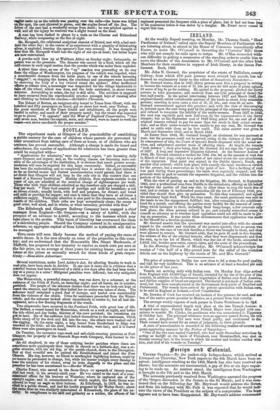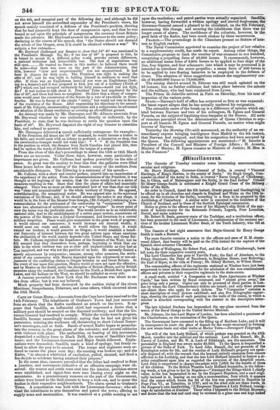goreign RIO 42Dolonial, Mum) STATEL-By the packet-ship Independence which arrived
at Liverpool on Thursday, New York papers to the 9th March have been re- ceived: intelligence reaching to the 18th March has also been received via Havre: but the accounts are unconnected, a gap of five or six days requir- ing to be made up. As matters stand, the intelligence from Washington is brought to the 7th and to the 16th March.
The accounts previously received from Washington narrated the progress of the Oregon discussion in the Senate to the ad March; and it was men- tioned that on the following day Mr. Heywood would address the House, and from his intimacy with Mr. Polk it was expected that he would indi- cate the views of the President on the subject of a compromise. The hope appears not to have been disappointed. Mr. Heywood's address commence&
on the 4th, and occupied part of the following day; and although he did not avow himself the accredited expounder of the President's views, his speech mainly consisted of a defence of the President's position, showing that he had purposely kept the door of compromise open, and that he was bound to act upon the principle of compromise the moment Great Britain
made the advance. Mr. Heywood avowed his adherence to the same policy; declaring in the course of his speech, that "the States should not demand the whole of the Oregon, even if it could be obtained without a war." We subjoin a few extracts— Mr. Heywood challenged any Senator to show that 54° 40' was mentioned in the President's Message. No, Sir; if the line of 490 is proposed to him, he
is bound to accept it; a different policy would provoke certain differences, a national dishonour and irremediable war. The door of negotiations was still open He wanted no finesse in this matter; he believed there would
be none—that there was none on the part of the Administration. Our
title, however "clear and unquestionable," was not unquestioned. It had been in dispute for forty years. The President was right in making the offer of 49°, and he was right in holding himself in readiness to meet that offer. If there was an Englishman here—if you were an Englishman (look- ing to a Senator) and it was proposed to kick you out of a territory (North of
49°) which you had occupied exclusively for forty years—would you not fight,
Sir? It was useless to talk about it. President Tyler had negotiated for the line of 49°, and there had been no complaint. He knew that a treaty of compro- mise would meet the concurrence of the Senate by a vote of two-thirds or three- fourths. He was in favour of the simple "notice," but would not vote in favour
of the resolution of the House. After expounding his objections to the amend- ment of Mr. Colquitt, recommending negotiations and a compromise, he advocated the adoption of the House resolutions as covering an all-sufficient ground.
An attempt was made by Mr. liannegan and Mr. Allen to ascertain from Mr. Heywood whether he was authorized, directly or indirectly, by the President, to state that he was desirous to settle the question upon the basis of 49°. Mr. Heywood disputed the right of any Senator to catechize him, and refused to answer.
Mr. IIannegrui delivered a speech sufficiently outrageous: for example— If the President did desert the 540 40' standard, he would become a traitor to his faith, and would meet with an infamy so profound, a damnation so deep, that the resurrection-trumpet would not wake him ! * * If the President was in the position in which the Senator from North Carolina had placed him, then had he spoken the words of falsehood with the tongue of a serpent.
From the close of this day's proceedings to about the 15th or 16th March there are no accounts. Under these dates, however, some particulars of importance are given. Mr. Calhoun had spoken powerfully on the side of peace. So great was the anxiety to hear him that the galleries were filled three hours before the meeting of the Senate; many of the auditors from considerable distances. The following is a summary of his speech— Mr. Calhoun, with a short and concise preface, entered into an examination of the expediency of the notice. From the recommendations of the President, it was thought at the begining of the session, Hut the notice would lead to a series of measures resulting in war. Since that time the phase of affairs had materially, changed. There was no more an idea entertained now of war than that our title was "clear and unquestionable" to the whole territory of Oregon. He opposed, notwithstanding, the unequivocal notice. He was opposed also to the equivocal resolutions of the House; and, if he should advocate the notice in any shape, it would be in the form of the Senator from Georgia, (Mr. Colquitt,) embracing a re- commendation for the settlement of the controversy by "compromise." 'There were two alternatives of settlement—war or a "compromise." In every point of view the latter was the preferable mode. War would involve us in an inextricable national debt, lead to the establishment of a rotten paper system, concentrate all the powers of the States into a Federal Government, and terminate in a central military despotism. Peace would give momentum to the great work of progress; it would extend our conunerce; it would increase our internal wealth; it would erect our roads and canals; it would relieve the States; it would extend our borders; it would preserve us Oregon; it would establish a benefi- cial fraternity of interest between the two great nations upon whose exertions the civilization of the world mainly depends—the United States and Great Bri- tain. Mr. Calhoun regretted the impatience of the Senators of the West; but he felt assured that they themselves were, perhaps, beginning to think that our title to the whole territory was not so clear and unquestionable as they had at st imagined, and war was not the pastime of an hour. He earnestly desired a speedy adjustment by compromise; because, among other measures, the settle- ment of our controversy with Mexico depended upon the adjustment or non-ad- justment of the conflicting claims to Oregon between us and Great Britain. In the event of war upon this question, Mexico would at once act upon the offensive; and by Mexico on the South, under the discipline of British officers, and by British steamers along the seaboard, the Canadians on the North, a British fleet upon the Lakes, and the Indians on the West, we should be enfiladed on every side. A rumour prevailed at New York that Mr. Buchanan was about to re tire from office; but it was not believed.
Much property had been destroyed by the sudden rising of the rivers Merrimac, Susquehanna, Delaware, and some others, which occurred about the 15th March.
CAPE or GOOD HOPE.—Accounts from the Cape have been received to the 14th February. The inhabitants of Graham's Town had just recovered from an alarm that the Kafirs meditated an attack on the town. It ap- pears that Sandilla, an influential chief, had expressed a desire that a military post should be erected on the disputed territory; and that the Go- vernor-General had resolved to comply. Whilst the works were in progress, Sandilla became exceedingly insolent; saying that he had not given his permission, ordering the workmen off, threatening to shoot Colonel Somer- set's messengers, and so forth. Bands of armed Kafirs began to perambu- late the country, to the great alarm of the colonists; and several robberies with violence took place. The authorities, on hearing of this movement, despatched a military force to Black Drift, the scene of Sandilla's turbu- lence; and the Lieutenant-Governor and Major Smith followed. Expla- nations were demanded; Sandilla made a kind of apology, but firmly re- fused to allow the post to be erected. The troops and engineers were or- dered to vacate the place next day ; the meeting was broken up; and the Kafirs, "in almost a whirlwind of exultation, yelled, shouted, and fired a fen-de-joie to celebrate having attained their purpose." In the mean time, rumours prevailed that the tribes had resolved to form a junction, and movements indicative of an offensive campaign were ob- served: the women and cattle were sent into the interior, provision-stores were established, and signal-fires were seen blazing every night on the mountains. As a precautionary measure on the part of the Government, orders were issued to the field-cornets to keep a look-out, and to scour the bushes in their respective neighbourhoods. The alarm spread to Graham's Town. A consultation was held with the Lieutenant-Governor; who ad- vised the inhabitants to arm themselves and patrol the town; offering to supply arms and ammunition. It was resolved at a public meeting to act upon the resolution; and patrol-parties were actually organized. Sandfile; however, having forwarded a written apology and craved forgiveness, the Governor-General caused a placard to be circulated, on the 9th February, announcing this change, and assuring the inhabitants that there was no longer cause of alarm. The confidence of the colonists, however, in the good faith of the Refire, had been much shaken by these occurrences.
FRANCE.—The proceedings in the Chambers present no feature of inte- rest to English readers. The Naval Commission appointed to examine the project of law relative to a supplementary credit, has made its report. Among other things, the
Commission proposes to limit the number of war-steamers to one hundred,
comprising a propelling force of 28,800 horses. It recommends, however, an additional steam force of 3,800 horses to be applied to four ship' of the line, four frigates, and four schooners; into which it may be presumed it is intended to introduce the screw-propeller: a steam force of 800 horses is- to be applied to two floating batteries to be employed in the defence of rivers. The adoption of these suggestions reduces the supplementary cre- dit of 93,000,000 francs to 73,000,000.
The mining district around St. Etienne was still much agitated on the 2d instant; but no further collisions had taken place between the miners and the military, who had been reinforced from Lyons. The Prince de Joinville arrived in Paris on Saturday, from his tour of inspection of the various ports.
SeAns—Narvaez's hold of office has notproved so firm as was expected: the latest report alleges that he has actually tendered his resignation.
The ostensible cause of the break-up is a difference of opinion which ex- isted between Narvaez and two of his colleagues, M. Egana and General Pezuela, on the subject of legalizing time-bargains at the Bourse. All sorts- of rumours prevailed about the determination of Queen Christina to sup- port at all hazards M. Egana and General Peznela, no matter what might become of Narvaez.
Yesterday the Morning Chronicle announced, on the authority of an ex- traordinary express bringing intelligence from Madrid to the 4th instant, that Narvaez had resigned, and that his resignation had been accepted by the Queen. The following appointments are mentioned—" M. Isturitz is- President of the Council and Minister of Foreign Affairs ; M. Armero, Minister of Marine; M. Egana remains as Minister of Justice; M. Mon is- in the Finances."



























 Previous page
Previous page